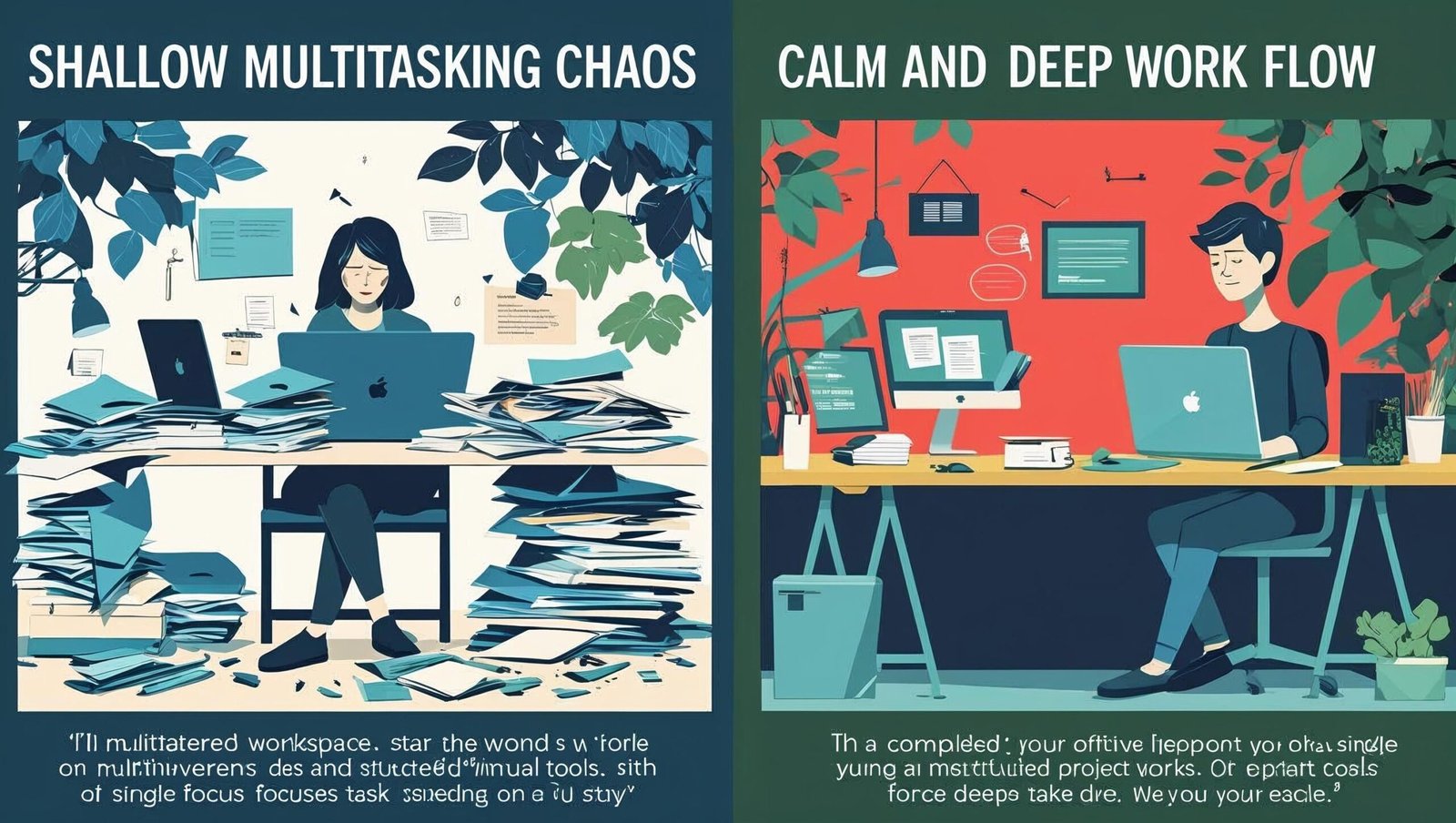1. Introduction
In a time ruled by constant interruption, the power of sustained attention is dwindling. Deep Work, a compelling work by Cal Newport, calls upon modern professionals to rediscover the sanctity of concentration. This blog post shall serve as a detailed review, guiding the reader through its philosophy, structure, application, and personal reflection.
To those adrift in a sea of distraction, Deep Work offers more than advice—it offers a lifeline. The importance of deep work cannot be overstated in today’s productivity landscape.

2. About Cal Newport and the Genesis of Deep Work
Cal Newport is not only a professor of Computer Science at Georgetown University but also a profound voice advocating for productivity without reliance on social media. In his book, Newport argues that the ability to perform deep, focused work is both rare and highly valuable.
He defines this type of work as:
“Professional activities performed in a state of distraction-free concentration that push your cognitive capabilities to their limit.”
This blog post explores the idea not merely as a theoretical concept, but as a practical, life-altering discipline. Newport’s argument for deep work lays a strong foundation for achieving meaningful goals.
3. Why Deep Work Matters in the 21st Century
Let us begin by acknowledging a stark truth—today’s knowledge workers are constantly pulled between emails, notifications, meetings, and multitasking. These shallow demands rob us of clarity and slow our professional evolution.
According to Newport, three key traits make focused work vital:
- It creates value: Focused effort leads to high-quality output.
- It is rare: Most professionals operate in states of perpetual distraction.
- It is meaningful: Deep work contributes to personal satisfaction and flow.
A consistent thread throughout the book is this: those who cultivate intense concentration will thrive in an increasingly automated and distracted world. Deep work is the currency of success in the 21st century.
4. Rule One: Work Deeply
Newport acknowledges that committing to distraction-free effort is hard, especially in environments designed for shallowness. Thus, he recommends rituals and routines:
- Set a dedicated time block daily (90 minutes or more).
- Remove all distractions—yes, even your phone.
- Define a shutdown rule: “I will stop at 5:30 PM. No work emails after that.”
- Keep a visual scoreboard—track your deep hours.
In essence, this kind of work is not merely an aspiration; it is a discipline. Practicing deep work requires conscious planning and commitment.
The Four Philosophies of Intense Focus
Newport introduces four philosophies to help individuals implement such work:
- Monastic Philosophy: Completely eliminate all distractions and dedicate yourself to a singular goal.
- Bimodal Philosophy: Divide your time between intense work and other obligations. Carl Jung’s retreat into the Black Forest for writing is a historical example.
- Rhythmic Philosophy: Establish a regular routine for deep work (e.g., writing for three hours every morning).
- Journalistic Philosophy: Fit focus time into your schedule whenever time permits, which requires immense discipline.
Adopting any of these depends on one’s personal circumstances, but the objective remains the same—making time for what matters most.
5. Rule Two: Embrace Boredom
We are addicted to stimulation. Every idle moment is filled with scrolling or swiping. Newport challenges this by suggesting we must train our minds to resist such urges.
“The ability to concentrate intensely is a skill that must be trained.”
Start by scheduling short “boredom sessions.” Go for a walk without your phone. Sit quietly for ten minutes. Reclaim your attention.
Productive Meditation
Newport introduces a powerful concept called “productive meditation”—think deeply about a complex problem while engaging in a physically simple task, such as walking or showering. This practice helps build cognitive endurance.
This rule underscores an uncomfortable truth: if you cannot embrace boredom, you will not master the art of sustained concentration. Mastery of deep work depends on your capacity to embrace quiet mental effort.

6. Rule Three: Quit Social Media
This is perhaps the most controversial of Newport’s rules. He does not argue for universal abstinence but encourages intentionality. Before committing to any platform, ask:
- Does it help you reach your professional or personal goals?
- Can the same benefit be achieved in a less damaging way?
By conducting a “Craftsman’s Tool Test,” Newport makes a case for selective digital minimalism.
Digital Declutter Challenge
Many readers have found success with Newport’s digital declutter challenge, where all optional technologies are set aside for thirty days. At the end of this period, individuals may reintroduce only the tools that provide substantial value.
The emphasis is not on abstinence but on discernment—choosing tools that serve you, not enslave you. This discernment is crucial for maintaining a deep work lifestyle.
7. Rule Four: Drain the Shallows
Newport invites us to audit our schedule for shallow tasks—those that do not require deep thought or that can be done while distracted. Meetings, emails, status updates—all these, while sometimes necessary, often dominate our days.
He recommends:
- Blocking time in your calendar for deep thinking
- Setting shallow work limits (e.g., <30% of your workweek)
- Making yourself less available
Time Blocking and Structured Scheduling
Time blocking is central to draining the shallows. Newport advises that every minute of your working day be accounted for in advance. Even planning time to check emails becomes an intentional act.
This rule reinforces a hard truth: unless you guard your time, others will consume it. The battle against shallow tasks is critical in preserving deep work time.
Deep Work boosts productivity and clarity for business success
8. Application in the Real World
Academia: Professors and PhD students use this method to write research papers, formulate complex ideas, and develop groundbreaking theories.
Software Engineering: Coders find focused time crucial when writing or debugging thousands of lines of code that require sustained logic.
Entrepreneurship: Startup founders and business strategists benefit from periods of intense focus to draft business plans, prototype ideas, and analyze markets.
Creative Writing: Writers, poets, and novelists turn to such practices to enter flow states and produce meaningful content.
Students: From high school to postgraduate levels, deep focus enhances learning retention, exam preparation, and conceptual clarity.
Healthcare: Surgeons, researchers, and medical students increasingly appreciate the role of deep concentration in diagnostics and learning new procedures.
Law and Policy: Legal professionals, especially those preparing briefs or analyzing precedents, use deep work to understand complexities and make coherent arguments.
Digital Creators: YouTubers, podcasters, and designers apply deep work principles to script, plan, and create content that resonates deeply with their audiences.
Corporate Professionals: Managers and consultants now set aside regular deep work blocks to think strategically, analyze reports, or plan high-impact projects. More companies are embracing a ‘no-meeting day’ each week to give teams time to work deeply.
Freelancers and Remote Workers: Without a rigid office environment, freelancers often fall prey to shallow routines. But by implementing Newport’s suggestions, they can turn solitude into a strategic advantage.
Leadership and Strategy: Senior leaders who often face decision fatigue can benefit immensely from deep work. Using focused time for strategic thinking, long-term planning, and vision crafting can strengthen their influence and company trajectory.
Education Sector: Teachers and academic planners can enhance lesson planning, curriculum design, and grading by adopting uninterrupted deep work sessions. The quality of educational material increases when built under focused effort.
Non-Profit and Policy Advocacy: Social workers and activists, too, benefit from deep work when drafting policy proposals, analyzing research data, or preparing campaigns that drive change.
Across these diverse fields, one insight remains true: focused effort fosters excellence. Deep work is the foundational habit behind great accomplishments.

9. Comment Section
Feel free to share your thoughts below. Has Cal Newport’s philosophy changed the way you approach your work or studies? Have you tried time blocking or quitting social media to gain focus?
Here are some thought-provoking comments to inspire readers:
- “Reading the book was a wake-up call. It’s not just a book—it’s a blueprint for a better mind.”
- “I implemented just one ritual Newport recommended—and my output tripled.”
- “Social media detox was hard. But now, my mornings are sacred.”
- “Cal Newport’s insights are deeply rational and emotionally convincing.”
- “The focused mindset helped me write my thesis without procrastinating.”
- “The structured schedule saved my startup from chaos.”
- “I now read physical books every morning before touching my phone.”
- “I convinced my team to hold a weekly ‘deep work sprint.’ Productivity soared.”
- “This book made me realize how addicted I was to notifications. Now I keep my phone in another room while working.”
- “We started a ‘silent hour’ in our office. Everyone loves it. No pings. Just work.”
10. Broader Implications and Reflections
While Cal Newport’s ideas initially appear to target productivity and professional growth, they hold broader implications for society at large. When individuals practice focused effort, the cumulative effect transforms communities, institutions, and cultures.
A More Focused Society
Imagine a world where educators are deeply immersed in developing curricula that truly inspire, where scientists explore frontiers of knowledge with full intellectual engagement, and where writers produce works that move generations. Deep focus is the foundation of civilization’s most prized achievements.
Mental Health Benefits
Ironically, the very tools that promise to enhance communication often erode psychological well-being. Constant task-switching is linked with increased anxiety, reduced memory retention, and decision fatigue. Focused work fosters tranquility, psychological clarity, and purpose. It teaches individuals to dwell in the present task—a practice akin to mindfulness.
Resisting the Attention Economy
The internet economy is increasingly based on harvesting user attention. Platforms are engineered to be addictive. Practicing focused concentration is an act of rebellion—a reclaiming of one’s attention from corporations that monetize it.
Work-Life Harmony
Newport’s shutdown ritual—signaling the end of the workday—is central to restoring boundaries in an era where work seeps into leisure. This approach doesn’t just boost output during work hours; it enhances quality of life by helping individuals be fully present outside work.
Rethinking Education Systems
Current education often prioritizes breadth over depth. Focused work invites a rethinking—how can schools and universities foster concentrated learning? Practices like long-form writing, solo research, and digital fasting may become crucial in preparing students for a cognitively demanding world.
Cognitive Capital and Economic Power
In a future shaped by AI, those who can think critically and work deeply will hold the upper hand. Deep workers build “cognitive capital”—a rare ability to synthesize information, develop insights, and produce original thought. Companies and nations that encourage this will lead.
Spiritual and Existential Fulfillment
There’s also a spiritual dimension to deep work. The sense of immersion, the joy of creating without interruption, and the alignment of one’s efforts with purpose can provide profound existential satisfaction. Deep work is not just professional—it’s soulful.
Legacy and Longevity
We remember creators not for how fast they replied to emails, but for the depth of their contributions. Books, theories, art, inventions—all stem from focused labor. Deep work enables the production of work that stands the test of time.

11. Deep Work and Creativity
While deep work is often associated with productivity, it also nourishes creativity. When our minds are free from interruption, ideas bloom more readily. Authors, artists, and thinkers have long recognized that solitude fuels originality. Newport’s approach offers structure to this timeless insight: true innovation often requires undivided attention.
12. Building a Deep Work Culture
Organizations can benefit immensely by fostering environments that prioritize depth. Creating quiet zones, limiting unnecessary meetings, and respecting focus hours are all cultural changes that support deep work. When companies empower employees to think deeply, they unlock higher performance and greater job satisfaction.
13. The Role of Sleep and Recovery
Deep work demands cognitive stamina—and that requires rest. Newport emphasizes that downtime is not laziness but essential. Sleep, exercise, and mental breaks replenish the mind’s ability to focus. By protecting rest, we enhance the quality and sustainability of our focused efforts.
14. Technology as an Ally
Though often a distraction, technology can also assist in cultivating deep work. Tools like website blockers, minimalist writing apps, and focus timers support attention. Used wisely, digital tools become enablers rather than inhibitors. The key is to make technology work for you, not against you.
15. Final Thoughts: Living the Deep Work Life
In the long run, deep work becomes a lifestyle. It’s not a one-off productivity hack but a deliberate shift in how we live and work. By protecting our attention and cultivating concentration, we craft more meaningful days.
Cal Newport’s thesis is not just about time management—it’s about identity. Are you someone who drifts through tasks or someone who builds things of substance? Deep work offers the blueprint to become the latter.
Whether you’re a student chasing academic excellence, a professional striving for mastery, or a creative yearning for meaning—this book shows the path forward.
So, start small: schedule one deep hour a day. Turn off the noise. Track your progress. You’ll be amazed by what you can create.
And when you do, come back and share your journey at shubhanshuinsights.com—because together, through intention and insight, we build a better mind.

16. Frequently Asked Questions (FAQs)
Q1: Is the concept still relevant in 2025?
Absolutely. With AI and automation increasing, human ability to focus on complex problems is more valuable than ever. Deep work remains crucial in this context.
Q2: Is this practice only for knowledge workers?
No. Artists, students, writers, and entrepreneurs can all benefit from structured, focused thinking.
Q3: How long does it take to build the habit?
Typically, 21 to 30 days of consistent practice can begin forming the habit.
Q4: What’s the biggest barrier to focused work?
Distraction—especially digital distraction. Newport calls this the “default mode of modernity.”
Q5: Is this approach compatible with collaborative jobs?
Yes, if you clearly define time for solo focus and time for communication.
17. Conclusion
In summation, Cal Newport’s work is not merely a productivity technique; it is a philosophy of craftsmanship in the modern era. His book is both timely and timeless. If you aspire to excel, to create meaningfully, and to reclaim your attention, then embracing deep work may be the wisest decision you make.
For more detailed book reviews and productivity frameworks, visit shubhanshuinsights.com — where intellect meets intention.
18. Epilogue: The Cost of Shallow Living
What is the true cost of distraction? It’s not just lost hours—it’s missed potential. In a culture that rewards rapid response over thoughtful output, we risk becoming spectators of our own lives.
Shallow living is easy, but it’s unfulfilling. Newport warns that if we do not take control of our attention, someone else will. Algorithms, platforms, and endless content compete for our eyes—but none of it feeds our soul.
The decision to pursue deep work is a quiet rebellion. It’s a return to craftsmanship, meaning, and deliberate living. Every moment reclaimed from distraction is a moment invested in mastery.
In the end, your legacy won’t be the emails you answered or the posts you liked. It will be the deep things you built when no one was watching. Choose deep work and elevate your life’s impact forever. Deep work shapes not only careers but also character and purpose.